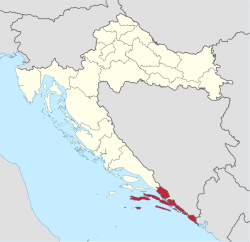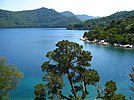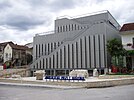Dubrovnik-Neretva County
Dubrovnik-Neretva County
Dubrovačko-neretvanska županija | |
|---|---|
 Dubrovnik-Neretva County within Croatia | |
| Country | Croatia |
| County seat | Dubrovnik |
| Government | |
| • Župan | Nikola Dobroslavić (HDZ) |
| • Assembly | 41 members |
| Area | |
• Total | 1,781 km2 (688 sq mi) |
| Population (2021)[2] | |
• Total | 115,564 |
| • Density | 65/km2 (170/sq mi) |
| Area code | 020 |
| ISO 3166 code | HR-19 |
| HDI (2022) | 0.887[3] very high · 4th |
| Website | edubrovnik.org |
The Dubrovnik-Neretva County (pronounced [dǔbroːʋniːk-něreːtʋa]; Croatian: Dubrovačko-neretvanska županija, pronounced [dǔbroʋat͡ʃko-nerěːtʋanskaː ʒupǎnija]) is the southernmost county of Croatia. The county seat is Dubrovnik and other large towns are Korčula, Metković, Opuzen and Ploče. The Municipality of Neum, which belongs to neighbouring Bosnia and Herzegovina, divides the county in two parts which are connected only by the Pelješac Bridge. The southern part of the county consists of Dubrovnik and the surrounding area, including the Pelješac peninsula, and the islands of Korčula, Lastovo, Mljet, Šipan, Lopud and Koločep. The northern part of the county includes the Neretva Delta, the Baćina lakes north of Ploče, and a swath of hinterland near the southernmost slopes of Biokovo and around the hill of Rujnica. The northern part of the Mljet island is a national park. The Lastovo archipelago is a designated nature park. The southernmost tip of the county is the Prevlaka peninsula at the border with Montenegro. It is the only Croatian county that borders Montenegro.
Although the 9 kilometres-long stretch of coast belonging to Neum effectively makes the southern part of the county an exclave (disconnecting it from mainland Croatia) it is still connected with the rest of the country via the Pelješac Bridge. Road traffic going to and from Dubrovnik through Neum is usually less subject to customs controls in order to reduce the traffic congestion. The road connecting Dubrovnik to the rest of the country via Neum has one lane per direction and bus lines passing through Neum often make rest stops there so that passengers can take advantage of lower Bosnian taxes and purchase tobacco and alcoholic beverages as they tend to be cheaper there.
Administrative division
[edit]On the local level, the Dubrovnik-Neretva County is further subdivided into 5 towns (grad, pl. gradovi) and 17 municipalities (općina, pl. općine).
| Town | Population (2021 census)[4] |
|---|---|
| Dubrovnik | 41,562 |
| Korčula | 5,415 |
| Metković | 15,235 |
| Opuzen | 2,838 |
| Ploče | 8,220 |
| Municipality | Population (2021 census)[4] |
|---|---|
| Blato | 3,330 |
| Dubrovačko primorje | 1,636 |
| Janjina | 522 |
| Konavle | 8,607 |
| Kula Norinska | 1,414 |
| Lastovo | 748 |
| Lumbarda | 1,209 |
| Mljet | 1,062 |
| Orebić | 3,705 |
| Pojezerje | 943 |
| Slivno | 2,046 |
| Smokvica | 868 |
| Ston | 2,491 |
| Trpanj | 683 |
| Vela Luka | 3,772 |
| Zažablje | 553 |
| Župa dubrovačka | 8,705 |
| Palagruža | 0 |
Demographics
[edit]
|
| |||||||||||||||||||||||||||||||||||||||||||||||||||||||||
| Source: Naselja i stanovništvo Republike Hrvatske 1857–2001, Croatian Bureau of Statistics, Zagreb, 2005 | ||||||||||||||||||||||||||||||||||||||||||||||||||||||||||
As of the 2021 census, the county had 115,564 residents. The population density is 65 people per km2.[2]
As of the 2011 census, the county had 122,568 residents. The population density is 69 people per km2.[5]
| population | 63379 | 63292 | 69185 | 74708 | 83135 | 87665 | 86610 | 90577 | 88535 | 94812 | 99593 | 108131 | 115683 | 126329 | 122870 | 122568 | 115564 |
| 1857 | 1869 | 1880 | 1890 | 1900 | 1910 | 1921 | 1931 | 1948 | 1953 | 1961 | 1971 | 1981 | 1991 | 2001 | 2011 | 2021 |
At the 2021 census, ethnic Croats formed the vast majority with 94.2% of the population, followed by Bosniaks at 1,4%, Serbs at 1.2% and 3.2% being other ethnic groups combined.[6]
Protected areas
[edit]- Mljet National Park
- Lastovo archipelago nature park
References
[edit]- ^ Ostroški, Ljiljana, ed. (December 2015). Statistički ljetopis Republike Hrvatske 2015 [Statistical Yearbook of the Republic of Croatia 2015] (PDF). Statistical Yearbook of the Republic of Croatia (in Croatian and English). Vol. 47. Zagreb: Croatian Bureau of Statistics. p. 62. ISSN 1333-3305. Retrieved 27 December 2015.
- ^ a b "The final results of the Census 2021 have been published". Croatian Bureau of Statistics. 22 September 2022. Retrieved 9 May 2023.
- ^ "Sub-national HDI - Area Database - Global Data Lab". hdi.globaldatalab.org. Retrieved 2024-10-10.
- ^ a b "Population by Towns/Municipalities" (xlsx). Census of Population, Households and Dwellings in 2021. Zagreb: Croatian Bureau of Statistics. 2022.
- ^ "Population by Age and Sex, by Settlements, 2011 Census: County of Bjelovar-Bilogora". Census of Population, Households and Dwellings 2011. Zagreb: Croatian Bureau of Statistics. December 2012.
- ^ "Population by Ethnicity/Citizenship/Mother tongue/Religion" (xlsx). Census of Population, Households and Dwellings in 2021. Zagreb: Croatian Bureau of Statistics. 2022.
External links
[edit]- Official website
 (in Croatian)
(in Croatian)












